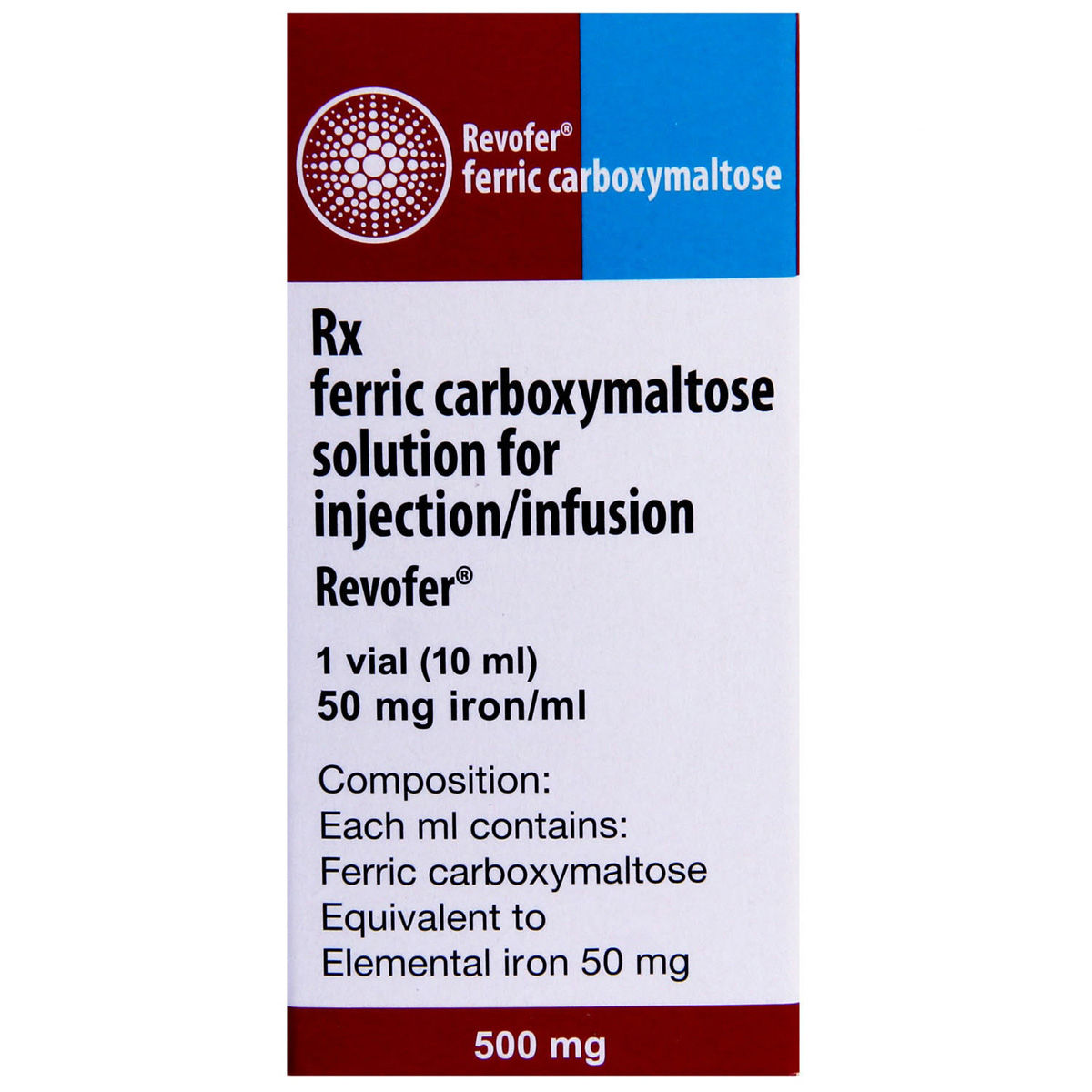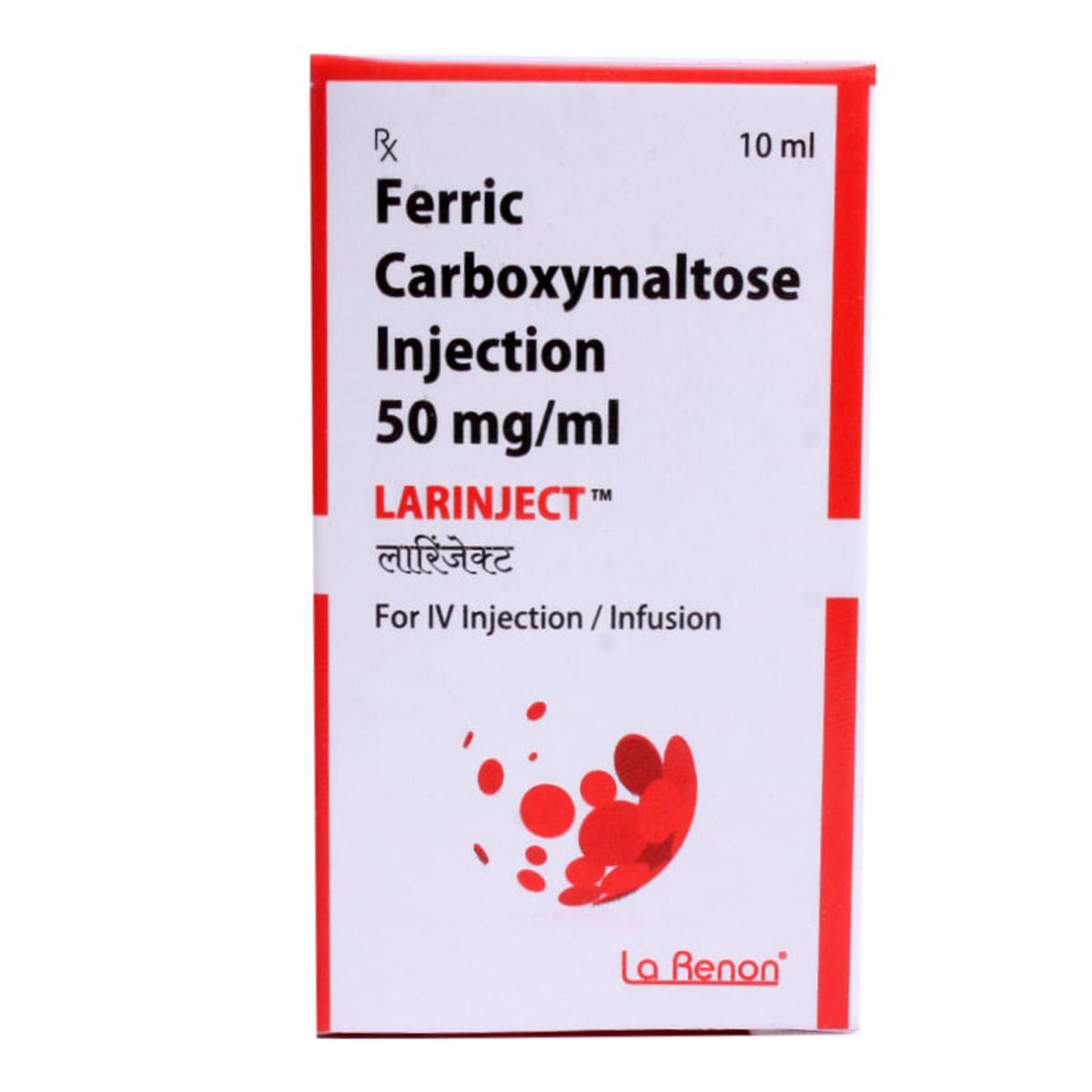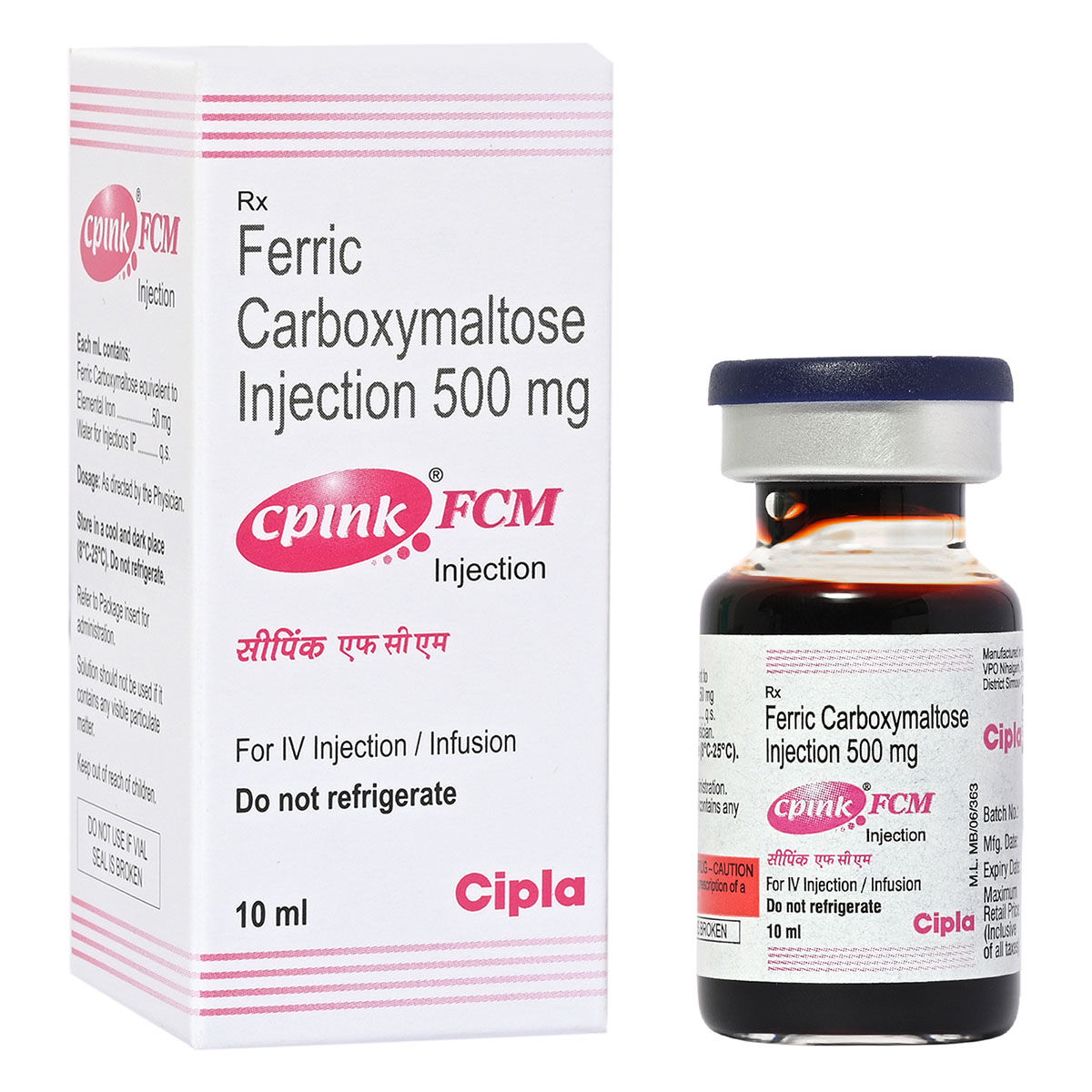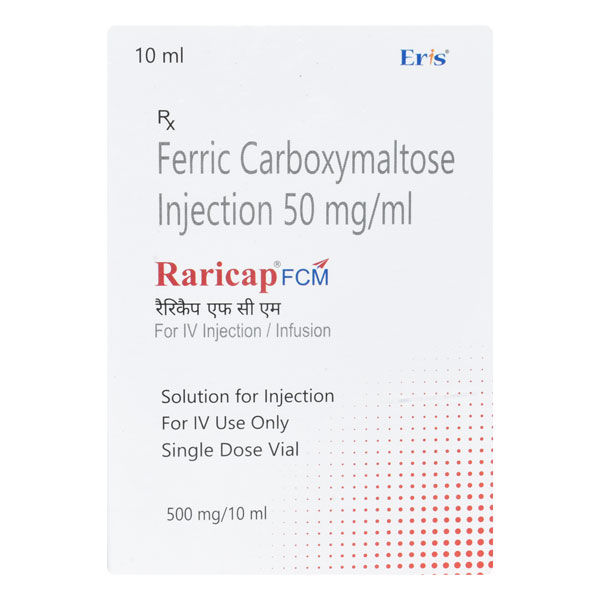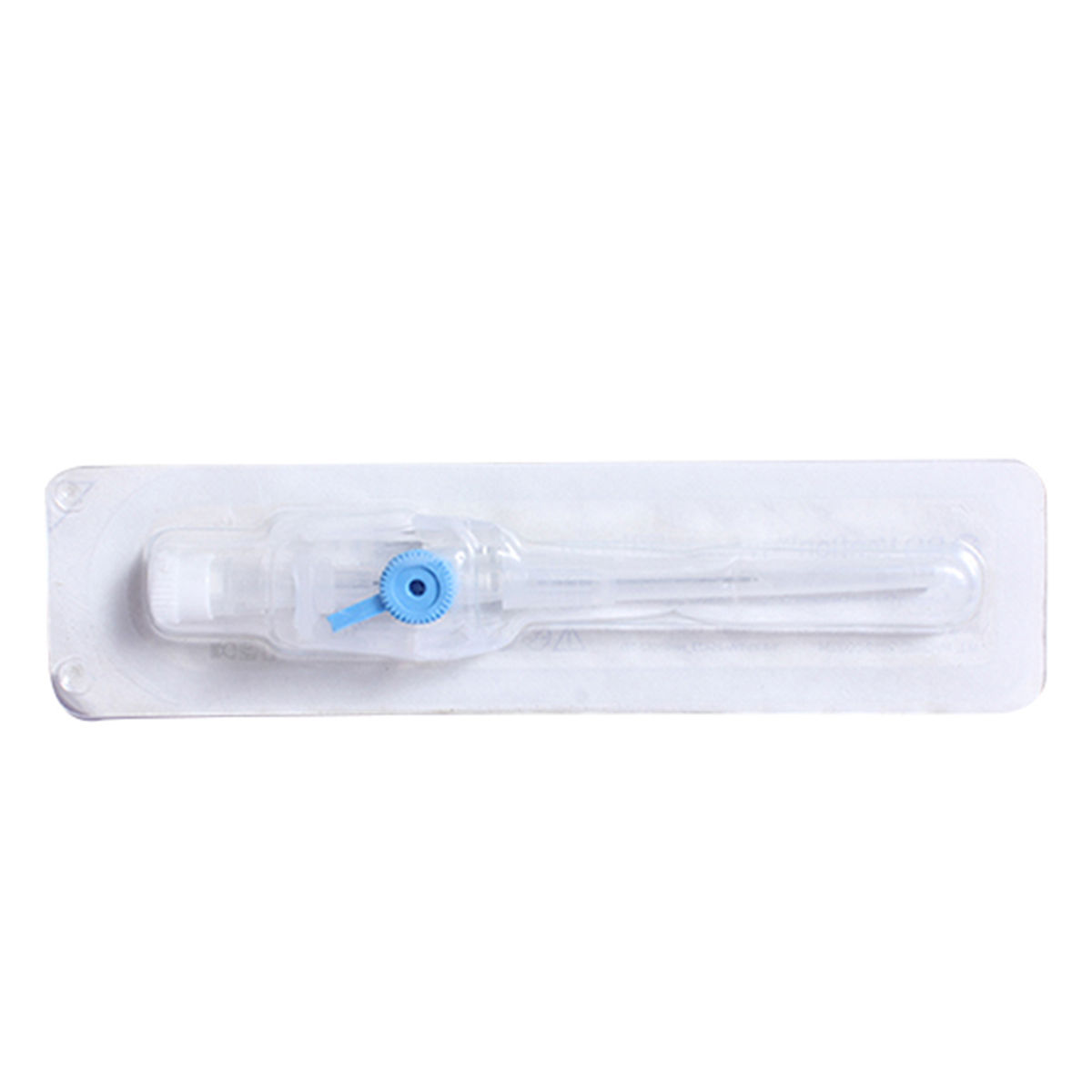Ferinject Solution for Injection 10 ml
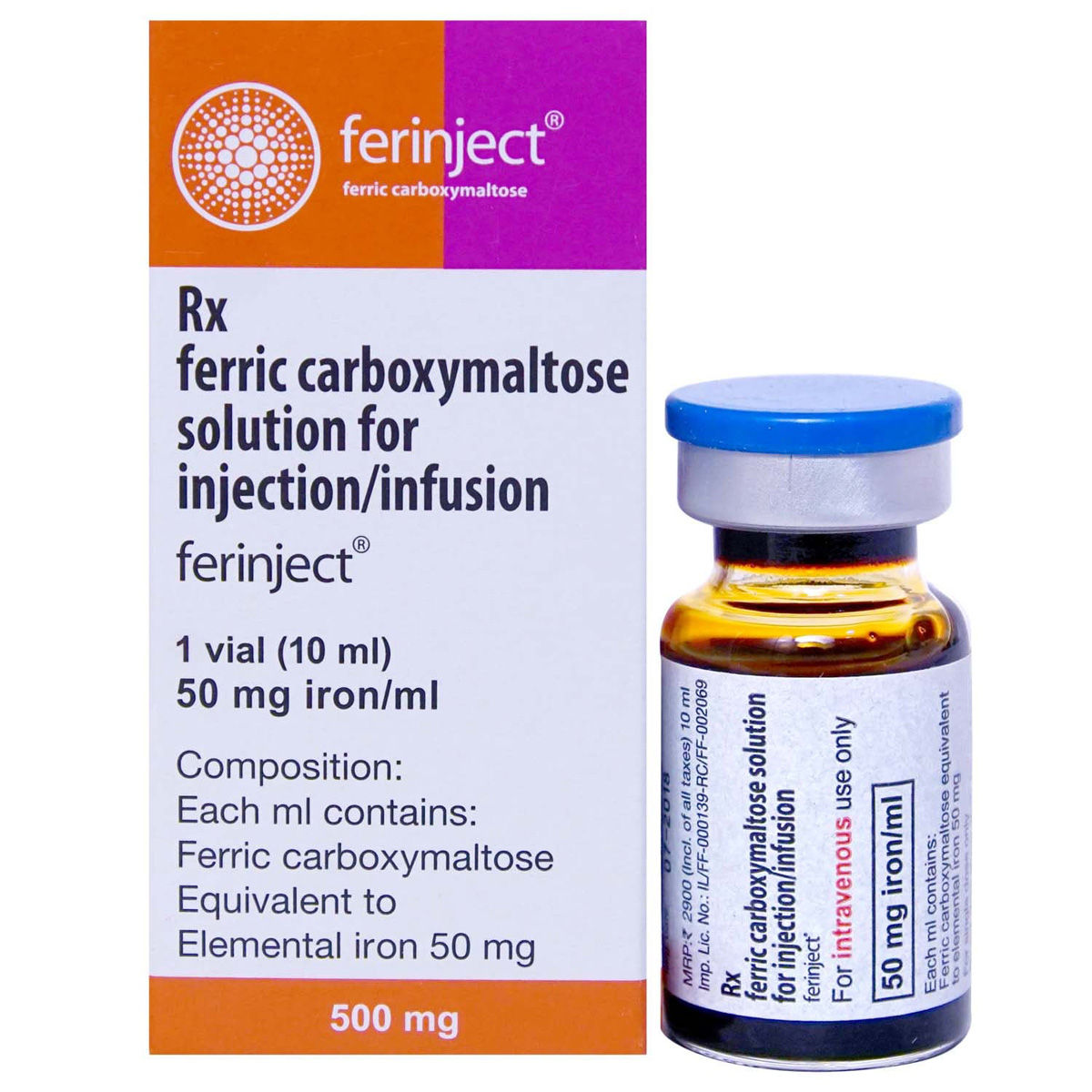
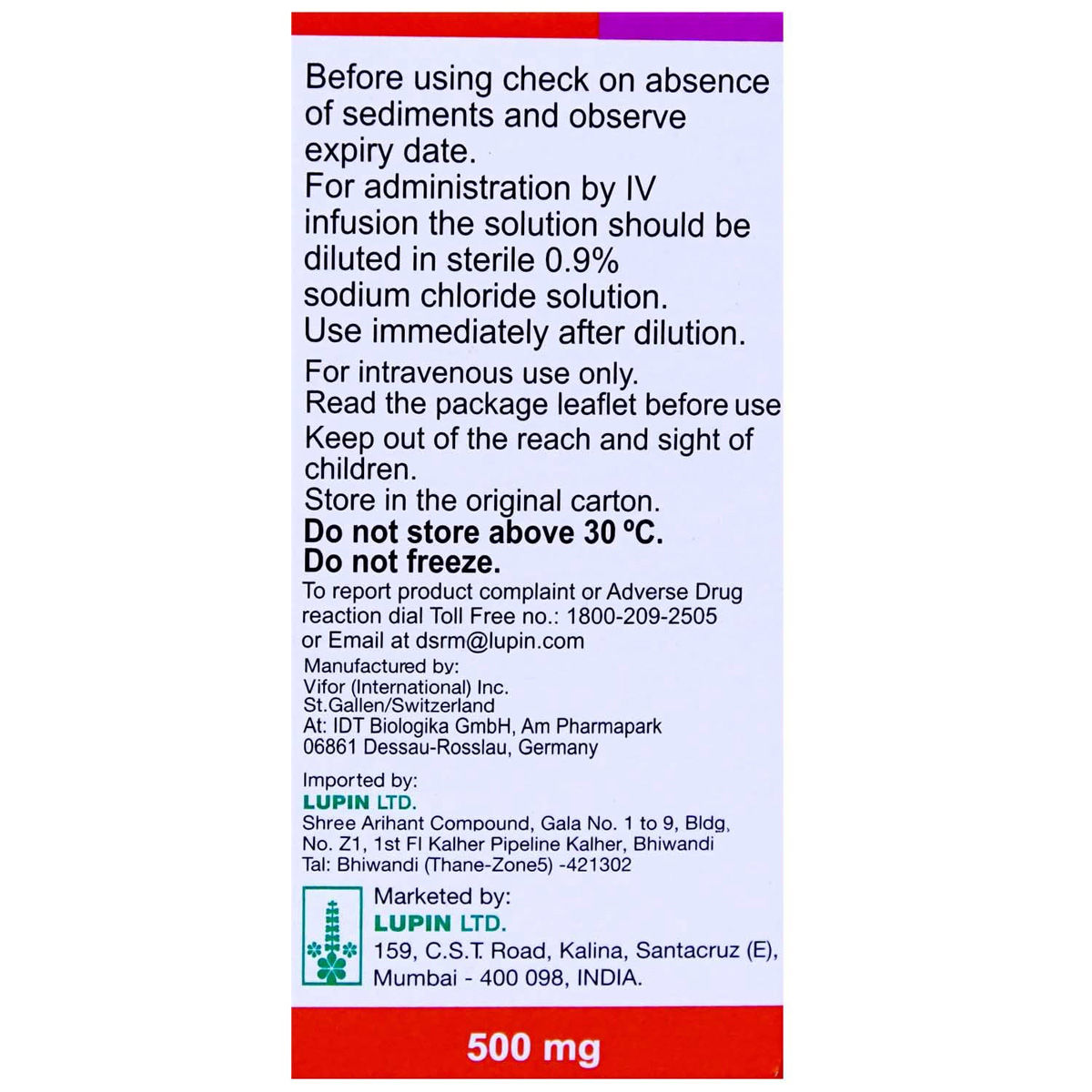
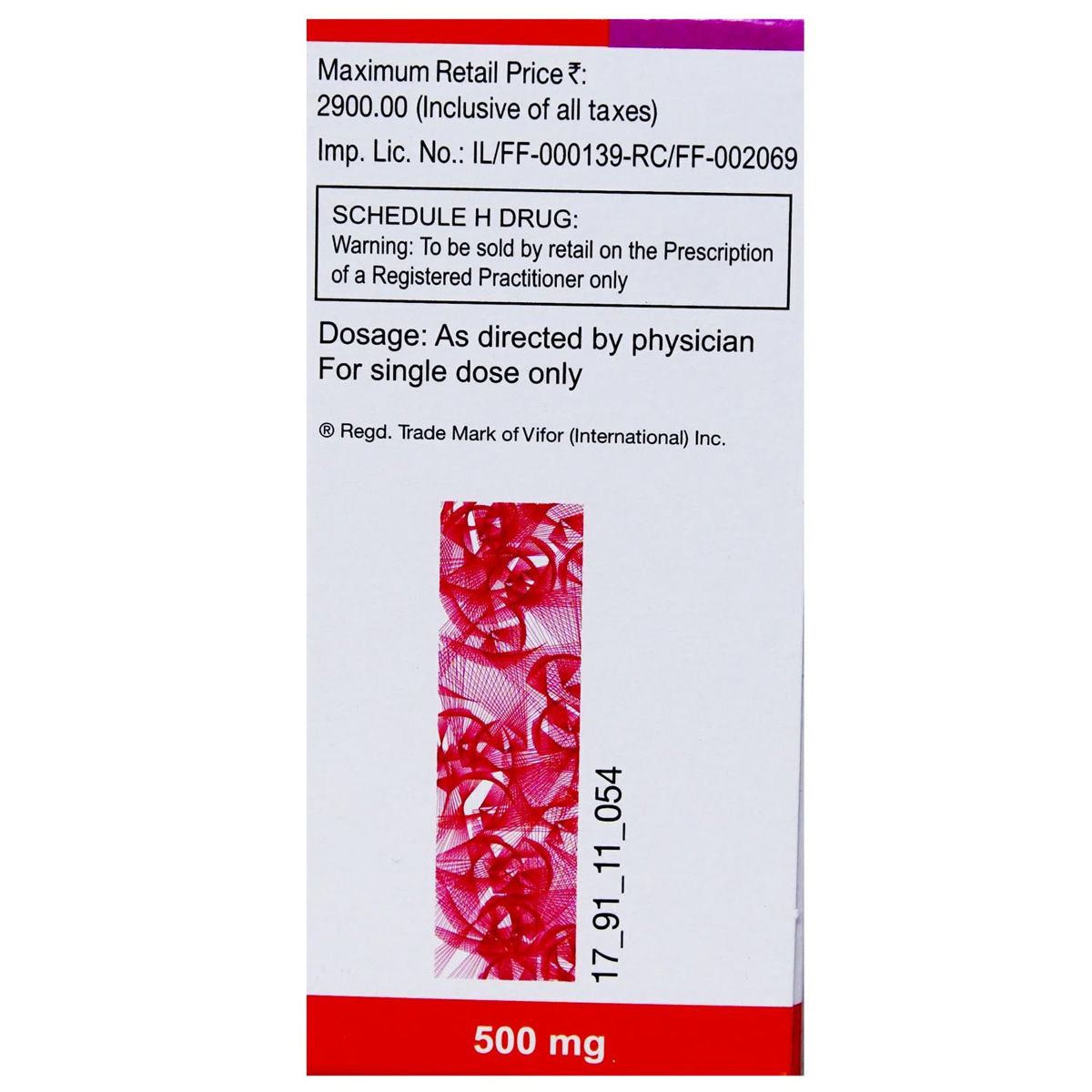
₹3019.2*
MRP ₹3682
18% off
₹3129.7*
MRP ₹3682
15% CB
₹552.3 cashback(15%)
Free Delivery
With Circle membership
(Inclusive of all Taxes)
This offer price is valid on orders above ₹800. Apply coupon PHARMA10/PHARMA18 (excluding restricted items)
Ferinject Solution for Injection is used to treat iron deficiency anaemia. It contains ferric carboxymaltose, which acts as a source of iron and helps in the transportation of oxygen throughout the body and the production of red blood cells. In some cases, this medicine may cause side effects such as nausea, flushing, dizziness, high blood pressure, and low levels of phosphorus in the blood. Before taking this medicine, inform the doctor if you are pregnant or breastfeeding, taking any other medication, or have any pre-existing medical conditions.
Know Your Delivery Time
Provide Delivery Location
Available Offers
 Prescription drug
Prescription drugWhats That

Secure Payment

India's Most Trusted Pharmacy

Genuine Products
Composition :
Manufacturer/Marketer :
Consume Type :
Return Policy :
Expires on or after :
About Ferinject Solution for Injection
Ferinject Solution for Injection belongs to the group of anti-anaemic medicines used to treat iron deficiency anaemia in patients who are intolerant to oral iron preparations, have non-dialysis dependant chronic kidney disease, or require a quick build-up of iron stores. Iron deficiency anaemia (lack of red blood cells caused by too little iron in the body) is a condition in which the body does not have enough red blood cells for carrying adequate oxygen to various body tissues.
Ferinject Solution for Injection contains ‘ferric carboxymaltose’, which acts as a source of iron and helps in the transportation of oxygen throughout the body and the production of red blood cells. Thereby, Ferinject Solution for Injection helps in treating anaemia. Ferinject Solution for Injection helps various vital processes in the body.
Ferinject Solution for Injection will be administered by a healthcare professional; do not self-administer. In some cases, you may experience certain common side effects such as nausea, flushing, dizziness, high blood pressure, and low levels of phosphorus in the blood. Most of these side effects do not require medical attention and will resolve gradually over time. However, you are advised to talk to your doctor if you experience these side effects persistently.
Let your doctor know if you are taking any prescription, non-prescription drugs, or herbal products before starting Ferinject Solution for Injection. If you are known to be allergic to any of the components in Ferinject Solution for Injection, please inform your doctor. Consult a doctor before taking Ferinject Solution for Injection if you are pregnant or breastfeeding. Ferinject Solution for Injection is not recommended for children below 14 years as safety and effectiveness have not been established.
Uses of Ferinject Solution for Injection
•Treatment of Iron Deficiency Anemia: Ferinject Solution for Injection is primarily used for managing iron deficiency anemia in patients who cannot tolerate or have not responded adequately to oral iron therapies.
•Supplementation for Chronic Kidney Disease Patients: Ferinject Solution for Injection is beneficial for individuals with chronic kidney disease, addressing anemia caused by reduced erythropoietin production and impaired iron metabolism.
•Support During Pregnancy: Pregnant women diagnosed with or at risk of iron deficiency anemia can use Ferinject Solution for Injection to maintain adequate iron levels for their health and the proper development of the fetus.
•Boosting Iron Levels Pre-Surgery: Ferinject Solution for Injection may be administered to patients before surgeries, especially those at higher risk of bleeding, to enhance iron stores and minimize anemia-related complications.
Directions for Use
Ferinject Solution for Injection will be administered by a healthcare professional; do not self-administer.
Medicinal Benefits
Ferinject Solution for Injection belongs to the group of anti-anaemic medicines used to treat iron deficiency anaemia in patients who are intolerant to oral iron preparations and have non-dialysis dependant chronic kidney disease. Ferinject Solution for Injection contains ‘ferric carboxymaltose’, which acts as a source of iron and helps in the transportation of oxygen throughout the body and the production of red blood cells. Thereby, Ferinject Solution for Injection helps in treating anaemia. Iron is necessary for various vital processes in the body.
How Ferinject Solution for Injection Works
Storage
- Consult your doctor if you experience skin redness, itching, or irritation after taking medication.
- Your doctor may adjust your treatment plan by changing your medication or providing guidance on managing your erythema symptoms.
- Your doctor may recommend or prescribe certain medications to help alleviate symptoms.
- Apply cool compresses or calamine lotion to the affected skin area to reduce redness and itching.
- Stay hydrated by drinking plenty of water to help alleviate symptoms and keep your skin hydrated.
- Monitor your skin condition closely and promptly report any changes, worsening symptoms, or concerns to your healthcare provider.
- Inform your doctor about the nausea and discuss possible alternatives to the medication or adjustments to the dosage.
- Divide your daily food intake into smaller, more frequent meals to reduce nausea.
- Opt for bland, easily digestible foods like crackers, toast, plain rice, bananas, and applesauce.
- Avoid certain foods that can trigger nausea, such as fatty, greasy, spicy, and smelly foods.
- Drink plenty of fluids, such as water, clear broth, or electrolyte-rich beverages like coconut water or sports drinks.
- Use ginger (tea, ale, or candies) to help relieve nausea.
- Get adequate rest and also avoid strenuous activities that can worsen nausea.
- Talk to your doctor about taking anti-nausea medication if your nausea is severe.
- Record when your nausea occurs, what triggers it, and what provides relief to help you identify patterns and manage your symptoms more effectively.
- Preventing Vomiting (Before it Happens)
- Take medication exactly as prescribed by your doctor. This can help minimize side effects, including vomiting.
- Having a small meal before taking your medication can help reduce nausea and vomiting.
- Talk to your doctor about taking anti-nausea medication along with your prescribed medication.
- Managing Vomiting (If it Happens)
- Try taking ginger in the form of tea, ale, or candy to help alleviate nausea and vomiting.
- What to Do if Vomiting Persists
- Consult your doctor if vomiting continues or worsens, consult the doctor for guidance on adjusting your medication or additional treatment.
- Report the itching to your doctor immediately; they may need to change your medication or dosage.
- Use a cool, damp cloth on the itchy area to help soothe and calm the skin, reducing itching and inflammation.
- Keep your skin hydrated and healthy with gentle, fragrance-free moisturizers.
- Try not to scratch, as this can worsen the itching and irritate your skin.
- If your doctor prescribes, you can take oral medications or apply topical creams or ointments to help relieve itching.
- Track your itching symptoms and follow your doctor's guidance to adjust your treatment plan if needed. If the itching persists, consult your doctor for further advice.
- Skin rash caused by allergies is due to irritants or allergens. Therefore, avoid contact with such irritants.
- Consult your doctor for proper medication and apply an anti-itch medication. Follow the schedule and use the medication whenever needed.
- Protect your skin from extreme heat and try to apply wet compresses.
- Soak in the cool bath, which gives a soothing impact to the affected area.
- Avoid trigger foods that can cause allergic reactions, such as nuts, shellfish, or dairy products.
- Keep a food diary to track potential food allergens.
- Include omega-3 rich foods like salmon and walnuts to reduce inflammation.
- Wear loose, comfortable clothing made from soft fabrics like cotton.
- Apply cool compresses or take cool baths to reduce itching.
- Use gentle soaps and avoid harsh skin products.
- Reduce stress through relaxation techniques like meditation or deep breathing.
- Inform your doctor about dizziness symptoms. They may adjust your medication regimen or prescribe additional medications to manage symptoms.
- Follow your doctor's instructions for taking medication, and take it at the same time every day to minimize dizziness.
- When standing up, do so slowly and carefully to avoid sudden dizziness.
- Avoid making sudden movements, such as turning or bending quickly, which can exacerbate dizziness.
- Drink plenty of water throughout the day to stay hydrated and help alleviate dizziness symptoms.
- If you're feeling dizzy, sit or lie down and rest until the dizziness passes.
- Track when dizziness occurs and any factors that may trigger it, and share this information with your doctor to help manage symptoms.
What if I have taken an overdose of Ferinject Solution for Injection
Drug Warnings
Do not take Ferinject Solution for Injection if you are allergic to any of its components, if you have anaemia not caused by iron deficiency, iron overload (excess iron in the body), or disturbances in iron utilisation. Inform your doctor if you have systemic lupus erythematosus, rheumatoid arthritis, severe asthma, eczema, infection, low phosphorus levels, high blood pressure, kidney or liver problems. Consult your doctor if you are pregnant or breastfeeding. Ferinject Solution for Injection is not recommended for children below 14 years as safety and effectiveness have not been established. Let your doctor know if you are taking any prescription, non-prescription drugs, or herbal products before starting Ferinject Solution for Injection.
Drug-Drug Interactions
Drug-Drug Interactions
Login/Sign Up
Taking Enalapril and Ferric Carboxymaltoside increases the side effects of enalapril.
How to manage the interaction:
Although taking Enalapril with Ferinject Solution for Injection 10 ml may possibly result in an interaction, they can be taken together if prescribed by your doctor. However, if you experience dizziness, lightheadedness, headache, blurred vision, or chest pain, consult your doctor immediately. Do not discontinue any medications without consulting your doctor.
Coadministration of Dimercaprol with Ferinject Solution for Injection 10 ml can increase the risk of developing kidney problems.
How to manage the interaction:
Although there is an interaction between Ferinject Solution for Injection 10 ml and dimercaprol, they can be taken together if prescribed by a doctor. Do not discontinue any medications without consulting a doctor.
Drug-Food Interactions
Drug-Food Interactions
Login/Sign Up
Diet & Lifestyle Advise
Follow a well-balanced diet.
Eat a healthy diet, especially green leafy vegetables, and do regular physical exercise.
Limit junk food and stick to freshly prepared home-cooked meals.
Increase your intake of fruits, especially fruits rich in iron like pomegranate, and citrus fruits.
Drink plenty of fluids to keep yourself hydrated.
Include leafy vegetables, poultry, seafood, beans, nuts, seeds, meat and fortified food in your diet.
Habit Forming
Therapeutic Class
Ferinject Solution for Injection Substitute

Orofer FCM 1K Injection 20 ml
by Others
₹266.13per tabletFerinject Injection 20 ml
by Others
₹256.94per tabletEncicarb Injection 10 ml
by Others
₹342.00per tabletOrofer FCM 750 Injection 15 ml
by Others
₹262.40per tabletFerium 1K Injection 20 ml
by AYUR
₹266.13per tablet
Product Substitutes
Alcohol
Caution
It is unknown if alcohol interacts with Ferinject Solution for Injection, so please consult a doctor.
Pregnancy
Caution
Consult your doctor if you are pregnant. Your doctor will decide if Ferinject Solution for Injection can be taken during pregnancy or not.
Breast Feeding
Caution
Consult your doctor if you are breastfeeding. Your doctor will decide if Ferinject Solution for Injection can be taken by breastfeeding mothers or not.
Driving
Safe if prescribed
Ferinject Solution for Injection is unlikely to affect your ability to drive. However, drive or operate machinery only if you are alert.
Liver
Caution
Please consult your doctor if you have a liver impairment or any concerns regarding this.
Kidney
Caution
Please consult your doctor if you have kidney impairment or any concerns regarding this.
Children
Unsafe
Ferinject Solution for Injection is not recommended for children below 14 years as safety and effectiveness have not been established.
FAQs
Ferinject Solution for Injection is used to treat iron deficiency anaemia in patients who are intolerant to oral iron preparations, have non-dialysis dependant chronic kidney disease, or require a quick build-up of iron stores.
Ferinject Solution for Injection acts as a source of iron and helps in the transportation of oxygen throughout the body and the production of red blood cells. Thereby, Ferinject Solution for Injection helps in treating anaemia.
Ferinject Solution for Injection might cause hypophosphatemia (low phosphorus levels). Inform your doctor if you experience symptoms such as severe tiredness, bone or muscle pain, as these could be a sign of low phosphorus levels. Regular monitoring of phosphorus levels whilst on treatment with Ferinject Solution for Injection is advised.
Consult your doctor if you have hypertension as Ferinject Solution for Injection might cause high blood pressure, sometimes accompanied by dizziness, facial flushing, or nausea. Your doctor will monitor for signs and symptoms of hypertension while on treatment with Ferinject Solution for Injection.
Ferinject Solution for Injection might cause the stools to appear darker than usual; this is due to the elimination of unabsorbed iron. Do not worry, as it is normal and harmless. Consult a doctor if this bothers you or if you notice blood in your stools.
Oral iron preparations will be less effective when taken along with Ferinject Solution for Injection. Inform your doctor if you are taking oral iron preparations or any supplements.
Iron deficiency anaemia occurs when the body's iron stores are too low to support the production of haemoglobin, a crucial protein in red blood cells that carries oxygen to the body's tissues. As a result, the body may not have enough healthy red blood cells or haemoglobin, leading to anaemia. Anaemia can cause symptoms like fatigue, weakness, pale skin, and shortness of breath.
Iron is a vital nutrient that can be sourced from a diverse range of foods. Animal-based options like red meat, poultry, and seafood are high in iron, with organ meats like liver and kidney being particularly rich. Plant-based sources include legumes like lentils, beans, and peas and leafy greens such as spinach, kale, and collard greens. Nuts and seeds like pumpkin, sesame, and sunflower are also good sources, along with fortified cereals and dried fruits like apricots, prunes, and raisins. Whole grains like quinoa, brown rice, and whole-wheat bread contain iron, too. Additionally, certain mushrooms like shiitake and oyster and cooked veggies like broccoli, Brussels sprouts, and sweet potatoes are iron-rich. Eating a varied diet that includes these foods can help ensure you meet your daily iron requirements.
Ferinject Solution for Injection is usually safe to take during pregnancy. It's an iron supplement that helps with iron deficiency and anaemia, which are common in pregnant women. If you have any concerns, talk to your doctor. They'll check your needs and ensure the benefits outweigh any risks.
The duration of taking Ferinject Solution for Injection depends on the individual's health condition and response to the medication. Always consult your healthcare provider for personalized advice on taking Ferinject Solution for Injection. They will assess your needs and provide guidance on the appropriate duration of treatment.
Ferinject Solution for Injection is a highly effective and well-tolerated iron supplement, particularly suited for individuals who struggle to absorb iron from food or have elevated iron requirements. However, talking to your healthcare provider before using Ferinject Solution for Injection is essential. They will diagnose and confirm iron deficiency or anaemia, recommend the appropriate dosage and duration of treatment, and monitor your response to treatment, making adjustments as necessary. This ensures that you receive personalized care and optimal management of your iron levels.
To boost your iron levels, complement your iron supplement (Ferinject Solution for Injection) with a balanced diet rich in iron-boosting foods. Opt for protein-rich options like red meat, poultry, and seafood, particularly shellfish and sardines. Legumes, including lentils, beans, and peas, are also packed with iron. Leafy greens like spinach, kale, collard greens, and broccoli are excellent choices. Pay attention to nuts and seeds like pumpkin seeds, sesame seeds, sunflower seeds, and whole grains like fortified cereals and quinoa. Dried fruits like apricots and prunes are also good sources of iron. Additionally, include a variety of cooked vegetables like bell peppers and sweet potatoes in your meals. Incorporating these iron-rich foods into your diet will support overall health and well-being.
You can take vitamin C/ Vitamin D/ multivitamin/ folic acid along with iron. In general, these vitamins do not cause any interactions, and they help in good iron absorption and healthy RBC. However, it's always a good idea to seek medical attention from a healthcare provider before starting any new supplement program to ensure it's appropriate for your specific health needs and to get proper guidance on usage.
Taking Ferinject Solution for Injection with zinc may increase the risk of certain side effects. However, if it is essential to use together, your doctor may change the dose or how often you use one or both of the medicines.
There are no documented interactions between Ferinject Solution for Injection and Tylenol (acetaminophen), but it is recommended that you inform your doctor before using them together to guarantee safety and prevent negative complications.
Taking Ferinject Solution for Injection does not typically lead to weight gain. However, as your anaemia improves, you may experience weight fluctuations. If you notice any unexpected changes in your body weight during treatment, consult your doctor to discuss potential causes and appropriate guidance.
Causing constipation is the most common side effect of the Ferinject Solution for Injection (especially in breastfeeding women if the doctor advises to use it). However, Ferinject Solution for Injection is not typically linked to acne development. If you experience worsening constipation or unexpected acne, consult your healthcare provider for personalized advice and management.
The common side effects of Ferinject Solution for Injection are nausea, flushing, dizziness, high blood pressure, Low levels of phosphorus in the blood, and some injection site reactions. However, these symptoms vanish as your body adjusts to the medication. If these symptoms become worse, please consult a doctor for relief.
Ferinject Solution for Injection is generally considered safe when following the instructions recommended by a doctor. However, like all medications, it can have side effects and potential interactions with other drugs. It's important to inform them of any pre-existing and existing medical conditions or medication history to avoid negative complications.
Country of origin
Manufacturer/Marketer address
Customers Also Bought
Disclaimer
Author Details
We provide you with authentic, trustworthy and relevant information
















